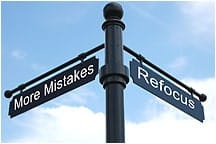 Mindfulness for athletes really means having awareness and then using the information from your awareness to help you compete. In a recent article for Forbes, Amy Morin posted an article containing a list of 13 things mentally strong people avoid. The list is helpful and has some research to back up the “things”. However, the article would be better if stated in the positive sense. That is, “what mental tools do mentally strong people use?” Every athlete wants to be mentally strong so here are a few highlights from her article:
Mindfulness for athletes really means having awareness and then using the information from your awareness to help you compete. In a recent article for Forbes, Amy Morin posted an article containing a list of 13 things mentally strong people avoid. The list is helpful and has some research to back up the “things”. However, the article would be better if stated in the positive sense. That is, “what mental tools do mentally strong people use?” Every athlete wants to be mentally strong so here are a few highlights from her article:
*This post may contain affiliate links. As an Amazon Associate we earn from qualifying purchases.
- Mentally strong people know the things they control; that is, they do not get lost in the trap of worrying what others think or trying to please others. This is wasted energy. Every person, including a teammate or coach, will think whatever they want! Your best response is always action. Do your best, give it all you have and then it does not matter what they are thinking.
- Mentally strong people are more present oriented rather than dwelling too long on past disappointments or mistakes.
- Mentally strong people can have genuine appreciation for the success of others.
- Mentally strong people maintain their power by managing their thoughts and emotions.
These recommendations offer a good summary of mindfulness in action. It takes a very mentally strong person to embrace and enact these ideas on a day to day basis. It might sound good, and you can easily agree, but the question is, how do people truly carry out these ideas and be part of the percentage that is mentally strong?
 Awareness, Acceptance and Action are the Mindfulness Steps Used to Help Build Mental Strength
Awareness, Acceptance and Action are the Mindfulness Steps Used to Help Build Mental Strength
- Awareness means checking in with yourself. The challenge proposed is that every time you check in on social media, such as Twitter or Facebook, etc., check in with yourself. Where is your mind? What are you dwelling on? Learn to do mini mental check-ins with yourself and consider these questions. Are you present-oriented? Are you worrying about something you cannot control? This helps build awareness, the tool you need to make change.
- Acceptance means admitting if you are dwelling on thoughts from the past or disappointments that are done. Rather than judging yourself or getting caught up in “WHY DO I DO THAT WHEN I KNOW BETTER?”, mentality you need to admit you are mentally engaging in unproductive focus and you need to change and move into a different action.
- Action means doing something necessary to help you return to the things associated with mental strength. Annie Pokorny, a professional Nordic skier, recently wrote an article in BirchScroll saying that positive-thinking athletes are likely to have lower heart rates and better response mechanisms than negative thinking athletes. Think of it like fuel or energy. Positive, challenge type focus can fuel you. If you really need to change your focus, get into a power stance or power pose as suggested by Amy Cuddy. Do the power pose for a couple of minutes and decide to make a focus or emotional shift.
